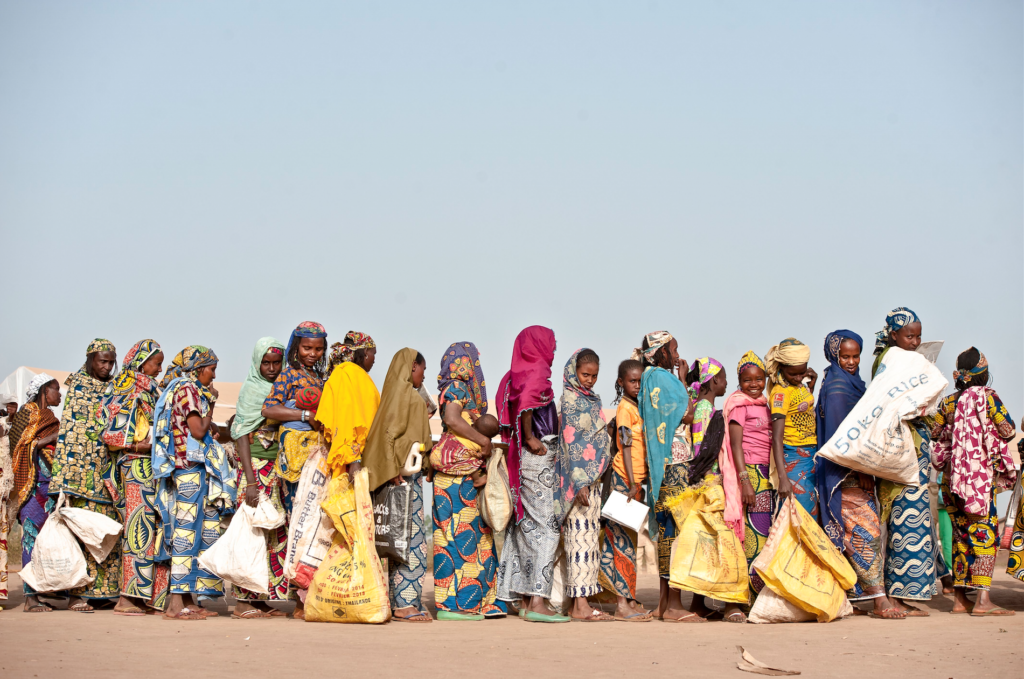by ISSA SIKITI DA SILVA
 Refugee women from the Central African Republic queue up in a refugee camp in Cameroon to receive food rations. PHOTO/UNHCR/C. Tijerina
Refugee women from the Central African Republic queue up in a refugee camp in Cameroon to receive food rations. PHOTO/UNHCR/C. Tijerina
Last year, Mohamed Keita returned home to Mali after living and working in Libya for six years. Eighteen months ago he was arrested by security forces in Libya as he and other migrants tried to cross the Mediterranean Sea to Europe via a makeshift boat. After spending a traumatizing six months in jail, he was transported back to Mali.
But as soon as he arrived he immediately knew that it would be difficult for him to stay put.
Keita’s home is in the central poverty-stricken Mopti region where his entire village still does not have power.
While his parents now live in the country’s capital Bamako, “even in our family house in Bamako, running water and electricity are luxuries. And when it’s raining, flooding occurs and kills people. These kinds of things, including armed conflict and terrorism, force you to go far away to look for a better life and peace,” he says as he wipes the sweat that falls heavily from his face as he works on a construction site on the outskirts of Cotonou, a major city in Benin.
Besides, he says, terrorism is still tearing the country apart, and peace and national reconciliation remain elusive.
The west African nation of Mali, which heads to the polls this Sunday Jul. 29, was caught in violent crisis in 2012 when a Tuareg group called the National Movement for the Liberation of Azawad began a fight for a separatist rule. However, AFP reported yesterday that despite recent attacks by jihadists and inter-ethnic violence, incumbent president Ibrahim Boubacar Keita said there was “no war-mongering in Mali today.” He was elected in 2013 soon after French intervention to bring peace to the nation.
But as far as Keita was concerned, no real social or economic development has taken place since he left.
Had there been, the 26-year-old tells IPS, it would have enticed him to stay and plan his future. So instead he headed to Benin, another west African country. In Cotonou, a vibrant and thriving place, he shares a small room with six other sub-Saharan African migrants who are waiting to make the journey to North Africa and eventually to Europe.
Benin, new migration hub?
The city is a far cry from his home village or even Bamako. Women from across the continent come here to buy local material that is highly sought after to make African dresses. Business is booming as the government doesn’t charge high taxes on small businesses.
Many also like it here because they consider xenophobia and police harassment to be non-existent. Last February, the government abolished short stay visas for 31 African countries in order to develop South-South cooperation.
Benin, a low-income country, has always been a transit route for west African migrants looking to make a fortune in the Democratic Republic of Congo, Congo-Brazzaville and Angola. It has also served as a stopping point for central African migrants looking to get to Morocco, Algeria and Tunisia, and perhaps continue their journey to Europe.
According to a 2015 United Nations report on the country, 2.1 percent of the 11 million people here are migrants, the vast majority of who come from the neighboring countries of Nigeria, Togo and Niger.
Toward Freedom for more
